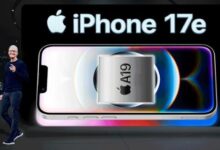Apple, Qualcomm Settle Royalty, Patent Dispute
 Apple and Qualcomm announced yesterday that they have settled their years-long litigation over the use of Qualcomm’s chips in Apple’s iPhones.
Apple and Qualcomm announced yesterday that they have settled their years-long litigation over the use of Qualcomm’s chips in Apple’s iPhones.
According to the Washington Post, the agreement includes the dismissal of all litigation between the two companies worldwide and includes a six-year licensing agreement and a multiyear supply agreement. According to a statement from the companies, Apple will also make a payment of an unspecified amount to Qualcomm.
The agreement was announced after lawyers for Apple made their opening argument in what was expected to be a three-week trial in a San Diego federal court.
Before the case settled, each side made blistering arguments attacking the other. Apple lawyer Ruffin Cordell accused Qualcomm of tricking standards bodies into using antiquated technology and then price-gouging Apple and its contract manufacturers into paying for technology they didn’t need.
In response, Qualcomm lawyer Evan Chesler revealed new documents that he said outlined a five-year plot by Apple to weaken the San Diego company through litigation to extract lower prices for technology in the iPhone. Then Apple did exactly what it had outlined in its secret plan, Chesler said, suing the company and twisting the arms of contract manufacturers to withhold royalty payments from Qualcomm. “This is like watching a play that you’ve already seen,” Chesler said in court.
The settlement between the companies sent Qualcomm’s stock soaring 22% Tuesday, raising the fortunes of the embattled company almost instantly. Qualcomm laid off more than 1,500 employees last year, in part to handle the onslaught of litigation and to reduce costs in the wake of a hostile takeover bid by rival Broadcom.
Qualcomm is still facing headwinds, including from Apple, which opened an office in San Diego in an effort to hire wireless-industry talent and develop its own modem chip. The wireless industry is competitive, and if Qualcomm can’t stay at the forefront of the technology, it could lose its edge.
Tuesday’s settlement is the culmination of a case that began in January 2017, when Apple alleged that the chipmaker and wireless pioneer had a stranglehold on the market for wireless modem chips that, until recently, were used in the iPhone. Apple contends that Qualcomm leveraged its position to overcharge for its patent licenses.
Rather than bend to Apple’s demands, Qualcomm countersued. Then Apple sued back. There were more than 80 lawsuits between the two companies in Asia, Europe and the United States.
As the price of an iPhone has increased over the years, Qualcomm also earned more money because its technology licensing agreements were based on the wholesale price of the phone. Apple found this fact particularly irksome. Unlike other handset-makers, Apple managed to negotiate its fee to about $7.50 (roughly Rs. 520) per unit, according to court filings and a person familiar with the matter. That’s a price Apple still believes is too high.
Apple also took issue with Qualcomm’s sale of model chips, in addition to a licensing fee that bundled all of Qualcomm’s technology together. At Tuesday’s trial, Apple argued that was like paying twice and likened it to buying Kentucky Fried Chicken and then being charged extra for a license for all the methods and spices that went into cooking the chicken.
Qualcomm argued that the bundle of technology patents includes not just the chip technology but myriad wireless tech that Apple needs in its iPhones. Apple was asking to pay for its chicken and get a side of potatoes for free, Qualcomm said Tuesday.
Some nations have taken a dim view of Qualcomm’s licensing strategy. In 2015, the Chinese government fined the company $975 million (roughly Rs. 6,800 crores) for the way it bundles its licenses, forcing more favourable terms for Chinese manufacturers. In December 2016, South Korea fined Qualcomm $865 million for allegedly refusing to license competing chipset companies, an assertion Qualcomm denies. The two sides eventually reached a settlement.
Then, in January 2017, the Federal Trade Commission brought its own case against Qualcomm stemming from the same issues. Qualcomm defended itself in an 11-day trial in January. The company is awaiting a decision from Judge Lucy Koh, who presided over the trial.
The terms of Apple’s new licensing agreement with Qualcomm were not disclosed Tuesday, and it’s unclear whether those terms will still put Qualcomm in the crosshairs of the FTC. Qualcomm could have licensing agreements with other companies that the FTC may find problematic.
The FTC case marked the beginning of a tough year for Qualcomm. Apple filed its lawsuit later that month. Then, in November 2017, Broadcom made an unsolicited offer. When Qualcomm’s board rejected the deal, it turned into a hostile takeover bid. In March, the United States blocked the Broadcom takeover bid, citing concerns that the deal would hurt innovation and give foreign companies an advantage in developing cutting-edge wireless technology.
Before Tuesday, Apple had stopped making royalty payments, costing Qualcomm more than $7 billion, putting financial strain on the company and forcing it to curtail some research and development.
Qualcomm CEO Steve Mollenkopf and Apple CEO Tim Cook, whose relationship grew tense in recent months, were both set to testify in the trial that settled Tuesday.
The settlement hurt both companies, weakening Qualcomm and taking from Apple a potential supplier of 5G wireless technology. Apple has fallen behind its competitors in incorporating the new wireless standards in its phones.
The two companies went so far as to select a jury Monday and to summarize their arguments in opening statements in court Tuesday, but they didn’t wait to see what a panel of ordinary people would think about who was right and who was wrong in the acrimonious battle. Just before Qualcomm finished its opening remarks, the two sides came to an agreement.
Samson Oyedeyi with Report from Washington Post








